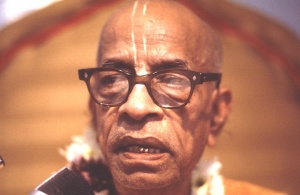SB 10.1.48: Difference between revisions
No edit summary |
(Vanibot #0054 edit - transform synonyms into clickable links, which search similar occurrences) |
||
| Line 23: | Line 23: | ||
<div class="synonyms"> | <div class="synonyms"> | ||
''mṛtyuḥ'' | ''[//vanipedia.org/wiki/Special:VaniSearch?s=mṛtyuḥ&tab=syno_o&ds=1 mṛtyuḥ]'' — death; ''[//vanipedia.org/wiki/Special:VaniSearch?s=buddhi&tab=syno_o&ds=1 buddhi]-[//vanipedia.org/wiki/Special:VaniSearch?s=matā&tab=syno_o&ds=1 matā]'' — by an intelligent person; ''[//vanipedia.org/wiki/Special:VaniSearch?s=apohyaḥ&tab=syno_o&ds=1 apohyaḥ]'' — should be avoided; ''[//vanipedia.org/wiki/Special:VaniSearch?s=yāvat&tab=syno_o&ds=1 yāvat]'' — as long as; ''[//vanipedia.org/wiki/Special:VaniSearch?s=buddhi&tab=syno_o&ds=1 buddhi]-[//vanipedia.org/wiki/Special:VaniSearch?s=bala&tab=syno_o&ds=1 bala]-[//vanipedia.org/wiki/Special:VaniSearch?s=udayam&tab=syno_o&ds=1 udayam]'' — intelligence and bodily strength are present; ''[//vanipedia.org/wiki/Special:VaniSearch?s=yadi&tab=syno_o&ds=1 yadi]'' — if; ''[//vanipedia.org/wiki/Special:VaniSearch?s=asau&tab=syno_o&ds=1 asau]'' — that (death); ''[//vanipedia.org/wiki/Special:VaniSearch?s=na&tab=syno_o&ds=1 na] [//vanipedia.org/wiki/Special:VaniSearch?s=nivarteta&tab=syno_o&ds=1 nivarteta]'' — cannot be checked; ''[//vanipedia.org/wiki/Special:VaniSearch?s=na&tab=syno_o&ds=1 na]'' — not; ''[//vanipedia.org/wiki/Special:VaniSearch?s=aparādhaḥ&tab=syno_o&ds=1 aparādhaḥ]'' — offense; ''[//vanipedia.org/wiki/Special:VaniSearch?s=asti&tab=syno_o&ds=1 asti]'' — there is; ''[//vanipedia.org/wiki/Special:VaniSearch?s=dehinaḥ&tab=syno_o&ds=1 dehinaḥ]'' — of the person in danger of death. | ||
</div> | </div> | ||
Latest revision as of 18:18, 17 February 2024

A.C. Bhaktivedanta Swami Prabhupada
TEXT 48
- mṛtyur buddhimatāpohyo
- yāvad buddhi-balodayam
- yady asau na nivarteta
- nāparādho 'sti dehinaḥ
SYNONYMS
mṛtyuḥ — death; buddhi-matā — by an intelligent person; apohyaḥ — should be avoided; yāvat — as long as; buddhi-bala-udayam — intelligence and bodily strength are present; yadi — if; asau — that (death); na nivarteta — cannot be checked; na — not; aparādhaḥ — offense; asti — there is; dehinaḥ — of the person in danger of death.
TRANSLATION
As long as he has intelligence and bodily strength, an intelligent person must try to avoid death. This is the duty of every embodied person. But if death cannot be avoided in spite of one's endeavors, a person facing death commits no offense.
PURPORT
It is natural for a person facing untimely death to try his best to save himself. This is one's duty. Although death is sure, everyone should try to avoid it and not meet death without opposition because every living soul is by nature eternal. Because death is a punishment imposed in the condemned life of material existence, the Vedic culture is based on avoiding death (tyaktvā dehaṁ punar janma naiti (BG 4.9)). Everyone should try to avoid death and rebirth by cultivating spiritual life and should not submit to death without struggling to survive. One who is not trying to stop death is not an intelligent human being. Because Devakī was face to face with imminent death, it was Vasudeva's duty to save her, as he was trying his best to do. He therefore considered another way to approach Kaṁsa so that Devakī would be saved.